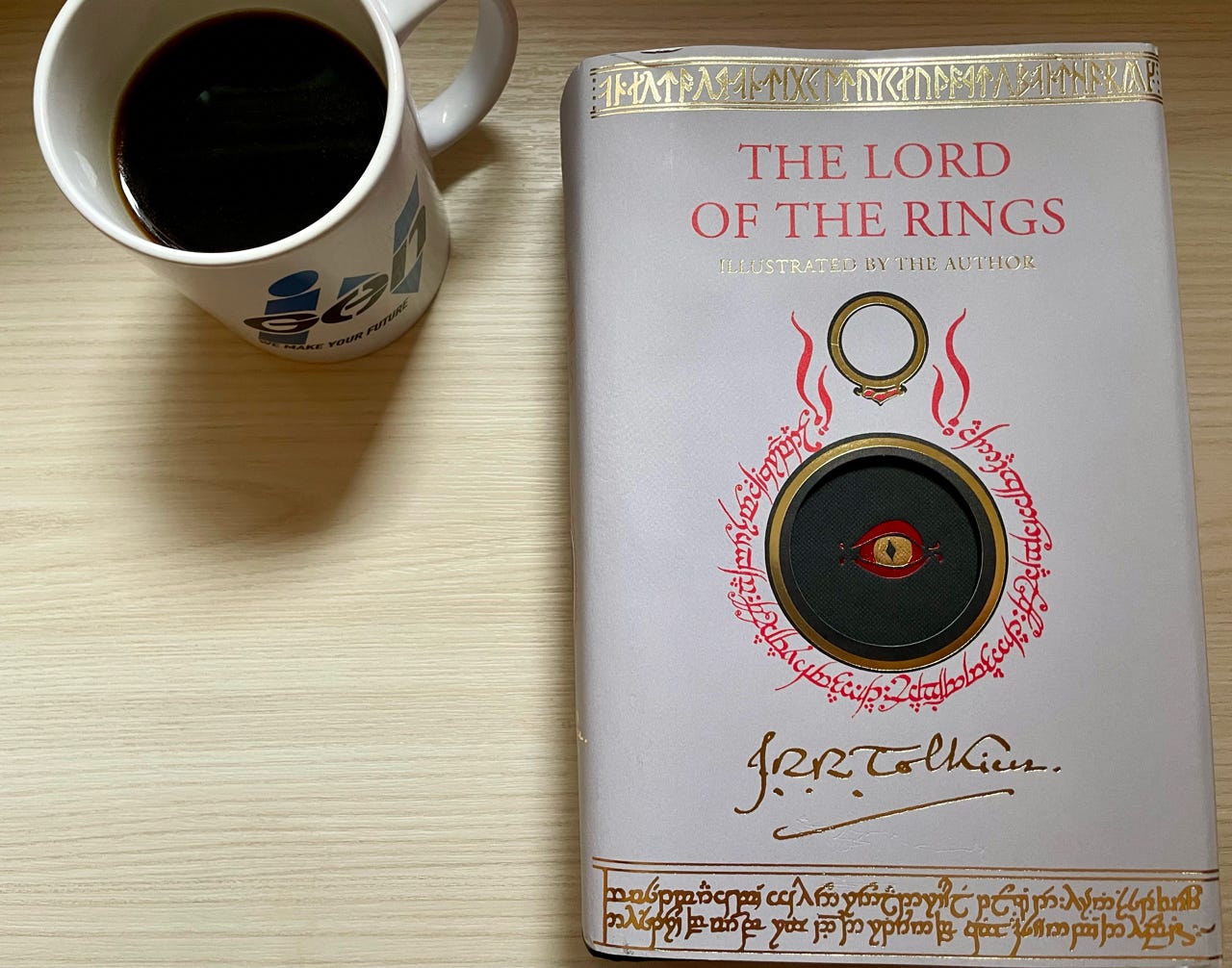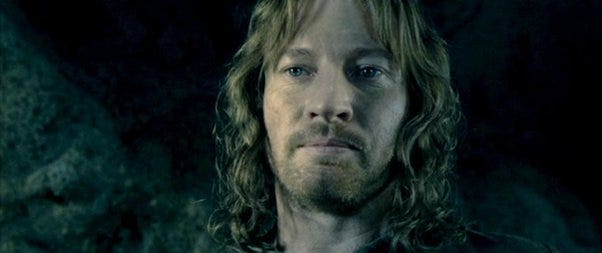Hello, friends.
Welcome to Least Important Things Monthly.
On Monday, we all celebrated the destruction of the One Ring in the fires of Mount Doom and the reclamation of the throne by King Elessar.
Wait.
You didn’t know?
Every March 25th is the official international Tolkien Reading Day in honor of the date Frodo Baggins and Samwise Gamgee (and Gollum) destroyed the Dark Lord Sauron’s master ring.
When I wished my wife “Happy Tolkien Reading Day” as she left the apartment for work, she smiled back in an air of sympathetic embarrassment. I knew my proclamation was the last thing she needed to hear on a workday morning before rushing to catch the train, but I couldn't resist seeing her reaction.
I don’t need an excuse to crack open my recently purchased The Lord of the Rings “illustrated by the author” edition, but soon after my wife left our abode, I started flipping to one of my favorite moments in the epic tale.
In the chapter “The Window on the West,” our heroes Frodo and Sam are captured by Gondor special forces in the woods of Ithilien, led by Captain Faramir. After lengthy questioning and a misstep by Sam, Faramir learns that these “halflings” were part of the fellowship of his deceased brother Boromir, and they possess the Ring of Power.
“And here in the wild I have you: two halflings, and a host of men at my call and the Ring of Rings. A pretty stroke of fortune! A chance for Faramir, Captain of Gondor, to show his quality!”
It’s decision time for Lord Faramir.
Take the One Ring for Gondor, or let the Hobbits finish their task?
In Peter Jackson’s adaptation of The Two Towers, Faramir’s decision is heightened for drama, and he only decides to let Frodo depart after witnessing the weapon's overwhelming control over the ringbearer.
While this conflict works for cinema, the source material handles it differently.
Instead of torment, Faramir laughs.
He quickly dispels the Hobbits' fear by explaining that even if he were a man who wanted to take the One Ring, he would still flee from its burden.
“If you took this thing on yourself, unwilling, at others' asking, then you have pity and honour from me. And I marvel at you: to keep it hid and not to use it.”
Faramir recognizes the Hobbit’s willpower by comparing him to an Elf and admires Frodo’s commitment to the quest. After discussing the details of the Hobbits’ next steps, Faramir carries an exhausted Frodo to his bed.
“Another bed was set beside him for his servant. Sam hesitated for a moment, then bowing very low: ‘Good night, Captain, my lord,’ he said. ‘You took the chance, sir.’
‘Did I so?’ said Faramir.
‘Yes sir, and showed your quality: the very highest.’
Faramir smiled. ‘A pert servant, Master Samwise. But nay: the praise of the praiseworthy is above all rewards. Yet there was naught in this to praise. I had no lure or desire to do other than I have done.’
‘Ah well, sir,’ said Sam, ‘You said my master had an Elvish air; and that was good and true. But I can say this: you have an air too, sir, that reminds me of, of - well, Gandalf, of wizards.’
‘Maybe,’ said Faramir. ‘Maybe you discern from far away the air of Númenor. Good night!’”
In a tale of brave and heroic acts, Faramir’s inaction is one of the critical moments in the fate of Middle Earth.
Unlike his brother, Faramir doesn’t see the One Ring as a tool for victory to protect his people.
He knows the history. He knows the entrapment of control.
By letting Frodo go, he’s, on paper, relinquishing the ammunition to defeat his enemy. But short-term glory and his father's approval aren’t worth the consequences if the One Ring survived.
In this moment, Tolkien reminds me that sometimes the most important decision a human can make is not to take action—to relinquish control of the results.
Without Faramir’s passive act, a victory wouldn’t have been possible. And I wouldn’t have celebrated on March 25th.
And my poor wife wouldn’t have to listen to nerdy nonsense on a Monday morning.
This Month's Least Important Thing
Sequels
In honor of the biggest sequel of the year, Dune: Part II, I decided to break down the history of sequels, why they keep getting made, and why they matter.
Here are your favorite sequels:
—
“Definitely The Lord of the Rings: The Two Towers. But also enjoy D2: The Mighty Ducks as well as The Dark Knight. I am all over the place.” - Brooks
“Dark Knight, always.” - Katelin
“Karate Kid 2, when Miyagi loses his father, and Daniel-San consoles him 🥲.” - Luis
“Shrek 2.” - Another Luke
“Matrix: Reloaded.” - Jackie
“Godfather Part: II or 2010.” - @Michelob Coors
“Austin Powers The Spy Who Shagged Me.” - Peter
“The Bourne Supremacy.” - Jim
“Evil Dead 2.” - Nick
“Mighty Ducks 2 aka D2.” - John
“Jurassic Park III. But some other favs: T2, Scream 4, Rocky 6, Mission Impossible 3, and Die Hard 2.” - Daniel
—
Listen to the latest episode of Least Important Things or watch it on YouTube.
Podcast of the Caribbean
Introducing the next LIT rewatch miniseries with Mike Wynne—Podcast of the Caribbean.
Set sail with us for the first installment from the series, Pirates of the Caribbean: Curse of the Black Pearl.
Listen to the episode or watch it on YouTube.
Next month’s episode will cover the sequel, Pirates of the Caribbean: Dead Man's Chest. Make sure you watch it before April 10th so you can watch along with us.
What’s a LIT rewatch miniseries? Don’t worry. Catch up by listening to Podcast: Impossible and Jurassic Pod.
Next Month’s Least Important Things
Why Is Black and White Still Used in Movies?
This year’s Oscars were dominated by two very different films, the biopic nuclear bomb epic Oppenheimer and the fantastical and theatrical Shelly Frankeinstein-inspired Poor Things.
There aren’t many crossovers between the two stories or cinematic structures, impressive though they may be, except for the use of black and white.
So, after 80 years since color film’s invention, why are filmakers using black and white?
Let me know your thoughts in the comments below, message me on Instagram, email me (leastimportantthings@gmail.com), or leave a voicemail.
Your thoughts will be featured in next month’s podcast and LIT Monthly.
Least Important Recommendations
Algorithm Be Damned
Recently, I texted my brother and recommended he watch this random YouTube channel I discovered. It features a bearded British man smoking a pipe in his study while reading excerpts from Tolkien.
Without solicitation, Jay already started watching him a few days prior.
Ye ole’ algorithm.
Does it know us better than ourselves?
Or is it simply that my brother’s interests are closer to mine than I’d like to admit?
Either way, besides Substack, YouTube is still a genuine platform to discover interesting people creating interesting content, algorithm be damned.
Here’s priest/poet/singer/savant Malcolm Guite’s special video for Tolkien Reading Day.
Guite’s prose is like listening to your grandfather, favorite professor, and strange dude at the end of the bar all at once.








